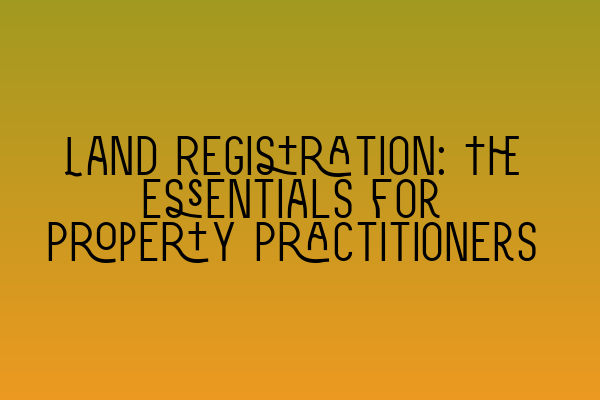Land Registration: The Essentials for Property Practitioners
As a property practitioner, you know that land registration is a crucial aspect of your work. It is the process by which ownership and other interests in land are recorded and protected. Understanding the essentials of land registration is essential to ensure smooth transactions and to provide optimal advice to your clients. In this blog post, we will discuss the key concepts and processes involved in land registration, providing you with the knowledge you need to excel in your practice.
1. Introduction to Land Registration
Land registration is a system that provides certainty and security in property transactions. It involves the creation of a register that records the ownership and other relevant details of land. This register is maintained by the Land Registry, an organization responsible for ensuring the accuracy and completeness of the information.
The main purpose of land registration is to determine the legal ownership and interests in land. It allows for the efficient transfer of ownership and the creation of legal charges over the land. Moreover, it offers protection against fraudulent activities and disputes by establishing clear evidence of ownership.
2. Application for First Registration
First registration is the process of registering land for the first time. This typically occurs when the land is newly created or when there is a change in ownership. As a property practitioner, you play a crucial role in guiding your clients through this process.
To apply for first registration, you need to complete an application form and submit it to the Land Registry. The form requires detailed information about the land, such as its boundaries, ownership history, and any rights or restrictions affecting the land. Ensuring that the application is accurate and complete is essential to avoid any complications or delays.
3. Title Registers and Title Plans
Once the land is registered, the Land Registry creates a title register and a title plan. The title register contains essential information about the land, including the registered owner, any rights or restrictions, and details of any mortgages or charges. On the other hand, the title plan depicts the boundaries of the land and any other relevant features.
As a property practitioner, it is important to carefully review the title register and title plan to ensure that they accurately reflect the information and boundaries of the land. Any discrepancies or errors should be rectified promptly to avoid any legal issues in the future.
4. Conveyancing and Land Registration
Land registration is closely intertwined with the conveyancing process. When dealing with a property transaction, you need to carefully review the title register and title plan to verify the ownership and any interests or rights affecting the land. This includes searching for any third-party interests, such as leases or easements, and ensuring that they are properly recorded.
In addition, you should conduct thorough searches to identify any potential issues or liabilities associated with the land. These searches may include environmental searches, local authority searches, and bankruptcy searches, among others. By conducting comprehensive searches and reviewing the land register, you can protect your clients’ interests and provide them with accurate and reliable advice.
5. Adverse Possession
Another aspect of land registration that property practitioners need to be familiar with is adverse possession. Adverse possession is a legal principle that allows someone who has occupied land without permission and without the owner’s objection to claim ownership over the land.
Understanding the requirements and limitations of adverse possession is crucial when advising clients. It is important to investigate and address any potential adverse possession claims to ensure that the ownership of the land is clear and unencumbered.
In conclusion, land registration is a fundamental aspect of property law practice. By understanding the essentials of land registration, including first registration, title registers and plans, conveyancing, and adverse possession, you can effectively navigate the complexities of property transactions and protect your clients’ interests.
At SQE Property Law & Land Law, we offer comprehensive preparation courses for both the SQE 1 and SQE 2 exams. If you are preparing for the SQE exams, check out our SQE 1 Practice Exam Questions and SQE 1 Practice Mocks FLK1 FLK2 articles to enhance your preparation. We also provide SQE 2 Preparation Courses to help you succeed in the second part of the qualification process. For more information about the SQE exams, including exam dates, visit our SRA SQE Exam Dates page.
Remember, staying updated and having a firm understanding of land registration is vital for property practitioners. By continuously expanding your knowledge and skills in this area, you can provide the best possible service to your clients and enhance your professional reputation.
